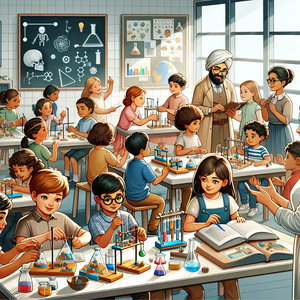The Art of Adaptability in Tech Careers

Adaptability is not just about responding to change; it's about anticipating it and proactively preparing for new challenges. Technology is inherently unpredictable, with trends emerging and fading in a matter of months. According to a report by the World Economic Forum, 85 million jobs may be displaced by 2025 due to the shift in labor between humans and machines. This statistic underscores the necessity for professionals to remain agile and open to learning new skills. As companies like Neovance and others continue to innovate, understanding how to navigate tech innovation becomes imperative for job seekers.
Expert Insights on Navigating Change
To gain deeper insights into the art of adaptability, we spoke with several tech professionals who shared their stories of transformation: 1. Sarah Johnson, Software Engineer: Sarah recalls the moment when her company transitioned from traditional software development methodologies to Agile practices. "At first, it was daunting," she explains. "But I embraced the change by attending workshops and seeking mentorship within my organization. This not only helped me adapt but also opened new opportunities for advancement." 2. David Chen, Data Scientist: David emphasizes the importance of continuous learning. "I was initially focused on machine learning, but as the industry evolved, I realized the need to expand my skills into data engineering. I enrolled in online courses and participated in hackathons. This adaptability not only made me more valuable to my team but also kept my passion for tech alive." 3. Lisa Patel, Cybersecurity Analyst: Lisa highlights the rapid evolution of cybersecurity threats as a driving force behind her adaptability. "In this field, you have to stay ahead of the curve. I regularly attend conferences and engage with online communities to learn about the latest trends. This proactive approach has helped me anticipate challenges and develop strategies to address them before they become critical."
Strategies for Cultivating Adaptability
Based on insights from these professionals, here are some actionable strategies to cultivate adaptability in your tech career: - Embrace a Growth Mindset: Approach challenges as opportunities for growth. View failures as learning experiences rather than setbacks. This mindset shift can empower you to tackle new situations with confidence. - Invest in Continuous Learning: Stay updated with the latest technologies and industry trends. Online courses, webinars, and certifications are excellent ways to enhance your skills. Platforms like Coursera, Udacity, and LinkedIn Learning offer a plethora of resources tailored to various tech fields. - Network and Collaborate: Build relationships with peers and industry experts. Networking can expose you to diverse perspectives and experiences, making it easier to adapt to changes. Participate in industry events, join online forums, or engage in local tech meetups. - Seek Feedback and Mentorship: Regularly seek feedback on your performance and areas for improvement. Mentorship can provide guidance and support during times of transition. A mentor can share their experiences and offer insights on how to navigate change effectively. - Stay Curious and Open-Minded: Cultivate curiosity about new technologies and methodologies. Allow yourself to explore areas outside your comfort zone, whether it’s learning a new programming language or delving into a different tech specialization.
In the ever-evolving landscape of technology, adaptability is not just an asset; it's a necessity. As Sarah, David, and Lisa have illustrated, embracing change and maintaining a proactive approach can open doors to new opportunities and career advancement. By cultivating a growth mindset, investing in continuous learning, networking, seeking feedback, and staying curious, tech professionals can navigate their careers with confidence, ready to face whatever the future holds. In a world where the only constant is change, those who master the art of adaptability will undoubtedly lead the way, positioning themselves as valuable assets to future-focused companies like Neovance and beyond.
Agile Software Developer
Atlassian, Spotify
Core Responsibilities
Collaborate with cross-functional teams to implement Agile methodologies in software development projects.
Participate in sprint planning, daily stand-ups, and retrospective meetings to ensure continuous improvement.
Develop and deliver high-quality software solutions while adapting to feedback and changing project requirements.
Required Skills
Proficiency in programming languages such as Java, Python, or JavaScript.
Strong understanding of Agile frameworks (e.g., Scrum, Kanban).
Experience with version control systems (e.g., Git) and continuous integration/continuous deployment (CI/CD) practices.
Data Engineer
Amazon, Google
Core Responsibilities
Design, construct, and maintain scalable data pipelines that facilitate data collection and transformation.
Work closely with data scientists to ensure that data is accessible, reliable, and ready for analysis.
Troubleshoot and optimize existing data workflows to enhance efficiency.
Required Skills
Proficiency in SQL and familiarity with programming languages such as Python or Scala.
Experience with big data technologies like Hadoop, Spark, or cloud platforms (e.g., AWS, Google Cloud).
Strong analytical skills and a problem-solving mindset to adapt to evolving data needs.
Cybersecurity Threat Analyst
Cisco, IBM
Core Responsibilities
Monitor network traffic and analyze security incidents to identify potential threats and vulnerabilities.
Develop and implement proactive measures to mitigate cybersecurity risks.
Collaborate with IT teams to enhance security protocols and incident response strategies.
Required Skills
In-depth knowledge of cybersecurity frameworks (e.g., NIST, ISO 27001).
Familiarity with security tools and software (e.g., SIEM, firewalls, intrusion detection systems).
Ability to stay updated with the latest cybersecurity trends and threat intelligence.
Machine Learning Engineer
Microsoft, Facebook
Core Responsibilities
Design and implement machine learning models and algorithms to solve complex business problems.
Collaborate with data scientists to refine and optimize model performance through continuous evaluation.
Deploy models into production environments and monitor their effectiveness over time.
Required Skills
Proficiency in machine learning libraries (e.g., TensorFlow, PyTorch) and programming languages (e.g., Python, R).
Strong mathematical and statistical skills for model development and evaluation.
Experience with cloud computing platforms for deploying machine learning solutions.
DevOps Engineer
Netflix, LinkedIn
Core Responsibilities
Collaborate with development and operations teams to automate and streamline software delivery processes.
Implement CI/CD pipelines to enhance deployment efficiency and reduce time to market.
Monitor system performance and troubleshoot issues to maintain operational stability.
Required Skills
Proficiency in scripting languages (e.g., Bash, Python) and familiarity with configuration management tools (e.g., Ansible, Puppet).
Strong understanding of cloud services and containerization technologies (e.g., Docker, Kubernetes).
Excellent problem-solving abilities and a proactive approach to system optimization.


